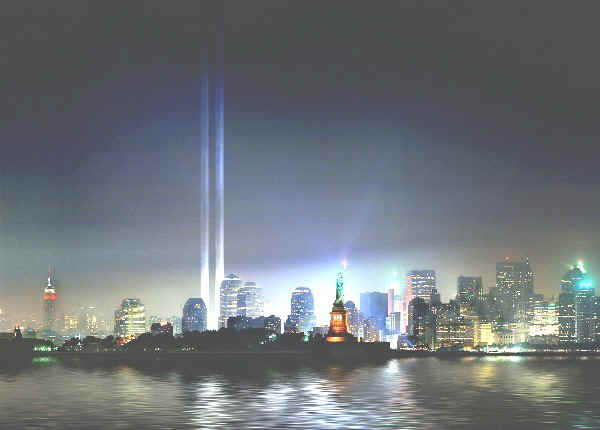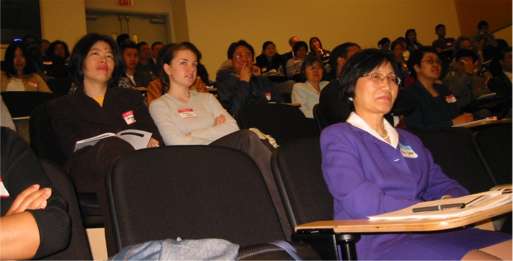
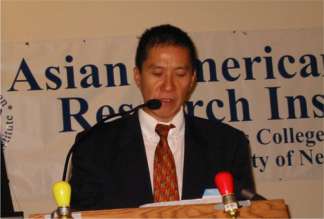
Dr. David Cheng:
Our first speaker this morning is President Ned Regan of Baruch College. He is a very personable and visible leader. He loves being with the students and you can see his smiling face on campus a lot of times if you just come to Baruch College. He has certainly gained the utmost trust and respect of the faculty and the students, and as I said, he has to go to another conference to give an address at 9:15, so let’s give a big, warm hand of appreciation to our President, Ned Regan.
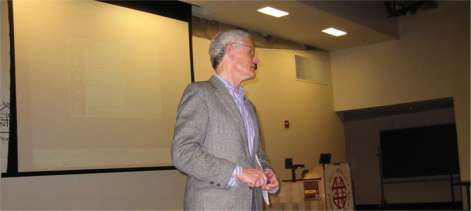
President Ned Regan:
Thank you very much. I am honored and proud of all those wonderful things that David just said. I’ll go along with all of them. I don’t get as embarrassed as I should. Excuse my informality.
We are delighted to have you here in this marvelous, marvelous building. We want you and we urge you to walk around about a bit. It was designed to create interaction between the professors and the students, and to break down the walls that sometimes separate people. It is a marvelous building. We’re so proud of it and we’re proud of how it has enhanced everything at Baruch. I am thrilled that I see in the program several panels and speeches that will be directed to that subject.
In fact, one of them says, “Surviving teaching at CUNY and the CUNY system.” Well, there is a little bit of that. The CUNY System is a university system which, as some of us know quite well, has some bureaucratic problems associated with it. But the mission of teaching the kids that we’re lucky enough to teach here at Baruch, and throughout the whole system, just makes a shadow of the sometimes hard and necessarily bureaucratic process. David is right – when I’m in my office and I’m frustrated and I get all worked up about something that I can’t get through or get done, I just get out of my office and get out with the kids. I hope you’ll do a little bit of that today.
There’s one thing about Baruch on a little public relations note: We are rated by the US News and World Report National, now the 2nd year in a row, as having the most diversified student body in the United States of America. We have 65 different languages spoken at home. We are working with the groups that are running the program to get the Olympics here in the year 2012, because of course our students will provide instant guides and translators, and they have already translated material for the Olympic Committee. I think the theme of the New York Chapter for Olympics is, “New York – The World’s Second Home”. Is that right? “The World’s Second Home.” In other words, everybody that’s in New York (most everybody and I can count myself there) has relatives, close family in some other place in the world. And no matter where you live, if you’ve got the means and the gumption and the ambition, you always end up at some point in your life in the great city.
We’re thrilled to have such a marvelous world in the city. And that really, I hope, will set some sort of note for this conference. That is the goal for the Asian Americans in the city. I have a fair amount of direct experience. I ran three times for New York State, and I won three times. I left the design at some point to pursue a different career, a little bit political. And somebody said, ‘What did you do? I heard you changed.’ And I said, ‘Yeah, I went from politics to politics.’ So it’s slightly different, and I have to tell you, a wonderfully rewarding experience. But I enjoy it. It was kind of knock on doors to get in and to accomplish and to get votes and to win.
But I have to tell you, the campaign in the Asian community was a little difficult. Not that people weren’t friendly, don’t misunderstand me. They were and that part was fun – going in and out of shops, that kind of thing, shaking hands. But then (and I’m going back 10 or 15 years), there seemed to be almost a disconnect between so many people in the Asian community – very successful business people, teachers, professors, lawyers – participants in the community. But there seemed to be a disconnect between the various communities, as I would see it on the street, grassroots level. No textbooks – door to door, shop to shop, handshake to handshake. As I would see it, there seemed to be a disconnect between the Asian community and public and civic life.
Let me assure you (and this is a reason I assume you’re having this conference) – people pay attention to people who vote and participate. You can say that’s awful. Political leaders should pay attention to the city, never mind the voter participation. But I’ll just conclude with this one story. Once I was talking to a group of high school councils. It was all seniors and they were all prepared to go to college and they had been selected by their peers in high school because of their leadership ability. At some point, one of them raised their hand and said, how come you people don’t…and something to the effect, you people in the government, you provide a lot for the senior citizens and you never provide anything for the youth. And so I said, ‘Everybody who’s 18 raise their hand.’ About 2/3 of their hands went up. Hands come down. I said, ‘Everybody who’s registered to vote raise your hand.’ Three went up. I said, what do you think, if I had been in a room of senior citizens, how many hands would have gone up? And you know what the answer is? All of them.
You can say to me, that they get senior citizen centers and tax breaks…I’m one for myself. I ride for 1/2 price on the subways and you pay for it, because your fare has to go up to help subsidize my fare. There are no breaks like that for anybody else. It’s unfortunate, but that’s the way the world works. If us politicians, which I was at that time, know that the senior citizens have the power to turn me out of office, or the power to elect me, what do you think I’m going to do? But if you kids don’t vote. And they said, well that’s awful, that’s selfish. I said, well I’m exaggerating a bit to make a point, of course it’s awful and selfish. And I don’t act that way, and I don’t think most of the people I’ve been in government will act that way either, but it’s something to think about.
I just urge, grab the city leaders and the state leaders by the throat. Grab them by the throat. Tell them you want what you want if you want it and get it. And then turn them out of office if they don’t deliver. These people live by the sword, let them die by the sword. Alright? Go in search of power, and we’d love to help you do that. Thank you very much. Thanks for coming.
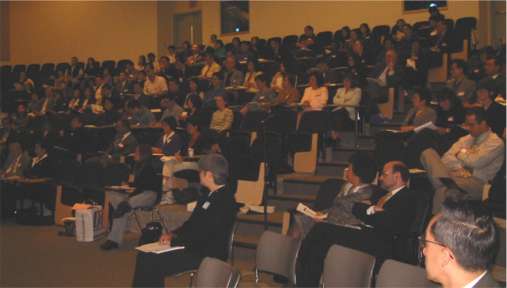
Dr. David Cheng:
We have a very ambitious and packed program for you today, so I think we have to move along a little bit. Our next speaker is somebody that I’ve been dying to meet for years. I heard so much about him in the past and there are so many things said about him, mostly positive of course. One thing that is sure, that everybody agreed upon, is that he is a very strong and passionate leader. Dr. Joseph Scelsa, a Bronx native, received his Doctorate in Sociology and Education from Columbia University, where he also received a Master’s degree in the same area. In addition, he holds two Master degrees in Secondary Education in Social Studies, Guidance and Counseling, both from Leboin College. Dr. Scelsa is the founder of the Calandra Italian American Institute. And currently, he is the Vice President of Institutional Development at Queens College. Dr. Scelsa is considered an expert in Italian American affairs. He teaches and lectures extensively in Italian American Studies, with a specialization in Italian Americans and their Civil Rights. Perhaps he could share with us some secrets of his success today for being such a strong and passionate leader. Dr. Scelsa.
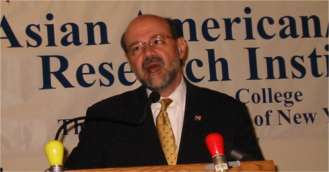
Dr. Joseph V. Scelsa:
Good morning everybody. I’m sorry that I wasn’t here for your breakfast, but I just arrived. And I fortunately was able to hear the concluding remarks of President Reagan. By way of introduction, I met him on the streets of the Bronx, back in 1979 (this is for Councilman Liu as well), when he was running for controller of the state of New York, along with then state senator John Collander, whose son is now a trustee of the University.
If you want to win it you’ve got to be in it and you’ve got to keep doing it. Persistence is the key to success. I think no one more than the Asian American community understands that, because with your history and your struggles, your achievements are earned every step of the way. And you must continue to do the same thing here now that we’re all Americans.
First let me begin by giving you greetings from the president of Queens College, who is unfortunately not able to be here with you today. But I’m very happy that I am, because I feel very close to you, and I want to say for Russell Hotzler, he supports you 100%. We couldn’t have been more pleased and proud to be the host campus for the Asian/Asian American Research Institute, here at the City University of New York. As you know all institutes (the Calandra Italian American is the one I headed up for 16 years), have to have a host campus. I could think of no better place, really. Although I understand the need to be universal throughout the city, no better place could there be than Queens College, academically. And I’ll tell you why.
Ethnic studies really have a strong foundation at Queens College. Years and years ago, when Italian American Studies was first being envisioned, back in the middle 70s and finally in the late 70s when Professor Richard Gambino of Queens College, started the program, he found a welcome home, because ethnic studies had already been started there and had been flourishing for quite some time with other different ethnic groups. They had Irish Studies, Jewish Studies, Italian American Studies and yes too, we have an African American Studies, which is college-based on the campus today. So Queens College has a serious, rich tradition in supporting ethnic studies, because it’s important.
My doctorate, as you kindly mentioned is in Sociology and Education. What you didn’t mention is that my dissertation is in Constructive Pluralism. And that’s what you’re all about. You’re all about constructively understanding your past so that we can move forward by understanding ourselves in the future – not only for the Asian American community, but for the whole community; not only for New York, but for the United States as well. You have a tremendous mission; don’t be hesitant to identify how much of a mission it is. And don’t be intimidated by the scope that you need to address, because you can address it. You are an emerging community where the time has come that it needs to be addressed. Proof of the success of your community is in the election of – unfortunately your first, but I’m sure there’ll be many more elected officials- John Liu here, who represents Flushing (part of Queens of course), who is now your city counsel representative and more than that, as the first Italian American representatives were in New York over 100 years ago. He represents not only the city and state but in many ways is a national voice as well because of that great position that he holds, and being in the world city that we’re in, he has even more of a voice. So you’re very fortunate. I’m very fortunate to have heard him (and I’m not patronizing you), I’m very fortunate to have heard you at our campus just last week. You’re tremendously articulate. You can’t have a better spokesperson than this in terms of being able to get your message across. You’re very, very fortunate. I think working with him and with others in the community, you will be extraordinarily successful.
I have a mission, and I mentioned constructive pluralism, because although I was the director of the Calandra Institute for so many years, my mission was basically to give the community a voice. I recognized early on when your executive director, Thomas Tam, who was then Trustee of the City University of New York, was looking to start something and wanted to look for models that could be successful. I hope you’ve taken the best, not the worst. I hope you won’t have to go through some of the struggles that I went through. We won’t need to go into that today. But I know that this is a man of great perseverance and great character. You couldn’t have a more wonderful champion and leader in this position. He’s steady, steadfast and professional. He makes everything that he does and you do look great, because it is great. In the academic circles, between the campuses and around the City University, he has a tremendous reputation, and that lends itself to this endeavor. I can’t think of anyone better to lead you as your first executive director. And I’m sure there will be others, as there were with myself, with you in the future.
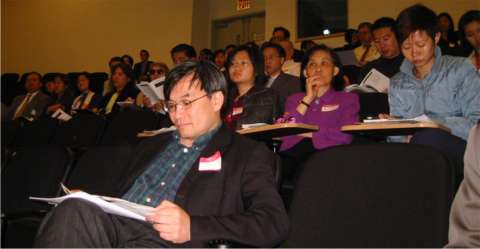
I congratulate you on this wonderful enterprise. We had to be a little low key on the campus. I really wanted you to be with Queens College and I made that known quietly, because I felt you could be in Manhattan – we have a campus here on 43rd Street between 5th and 6th Avenue. Queens College has an extension center there for those of you who don’t know. And we house three major institutes in the University which are affiliated with Queens College: the Calandra Institute I mentioned, the Worker Education Center, which is a wonderful program for Union Workers, and now the Asian/Asian American Research Center.
We have a nucleus in New York City even though we’re academically affiliated. Geographically, Queens is not far. Don’t try to get here, like I did this morning, from Westchester by car because it will take you too long. But by subway or by mass transportation, it’s very close. So I want to let you know that you have a wonderful, wonderful location and a wonderful site.
I know that your time is limited so I just wanted to address the nature of your conference for one second. I noticed in the preliminary flyers you have a number of very interesting questions and some great speakers and topics to talk about which we’ve got to move onto. It couldn’t be more appropriate that you’re looking at healing and rebuilding New York. One of our greatest presidents said, “Ask not what your country can do for you, but what you can do for your country.” Of course, that was JFK. In that same tradition of giving back and helping, I think that’s what this is all about. How are you going to deal with your changing communities? How are you going to deal with your inter-ethnic and groups within the Asian American community? That’s a very important question. Where are your communities today and where are they going? That’s another important question. How will those communities participate? How will you give them a voice? President Regan talked about it. I’ll be happy to. And I’ve been working with your leaders to try to help you do that more not only in government, but also in business and industry.
Don’t overlook business and industry. It’s a mistake. Our first indication-because we’re a public university and because these are public programs-is to deal with the city and the state, which is important. The city and state can only do so much of that. Our great Chancellor, Matthew Goldstein, in a wonderful initiative, has started a Business Leadership Council. And that Business Leadership Council is something that’s needed and warranted for public institutions, whereby the privates who have taken advantage in many ways of the brain trust that we have here, and the labor force that we provide them, need to give back to some of that. And he is making sure in positive ways that’s happening.
I think you should look to that as well. Look to the private sector as well as the public sector and make it a combination between the two. What is next for Asian American studies? Well that is what I am here to find out today. So without further ado, again I want to say on behalf of Queens College and the entire administration, and if I could be so humble to say for the City University of New York as a whole, we welcome you. We enjoy you. We want to work with you. We want to see you be very successful. You know that you have friends and that we will be with you every step of the way. So thank you very much. I will be with you most of the day today. I’ll see you later on. Thank you.
Copyright (c) Asian American / Asian Research Institute (AAARI), 2002.
All rights reserved. No part of this transcript may be reproduced or distributed in any form or by any means without explicit permission of the Asian American / Asian Research Institute.
Recording and transcription services are provided by Transcendent International, LLC.
If you wish to receive a CD containing the conference proceedings in audio and PDF transcripts, contact 1-800-497-1031 or info@TranscendentIntl.com.

